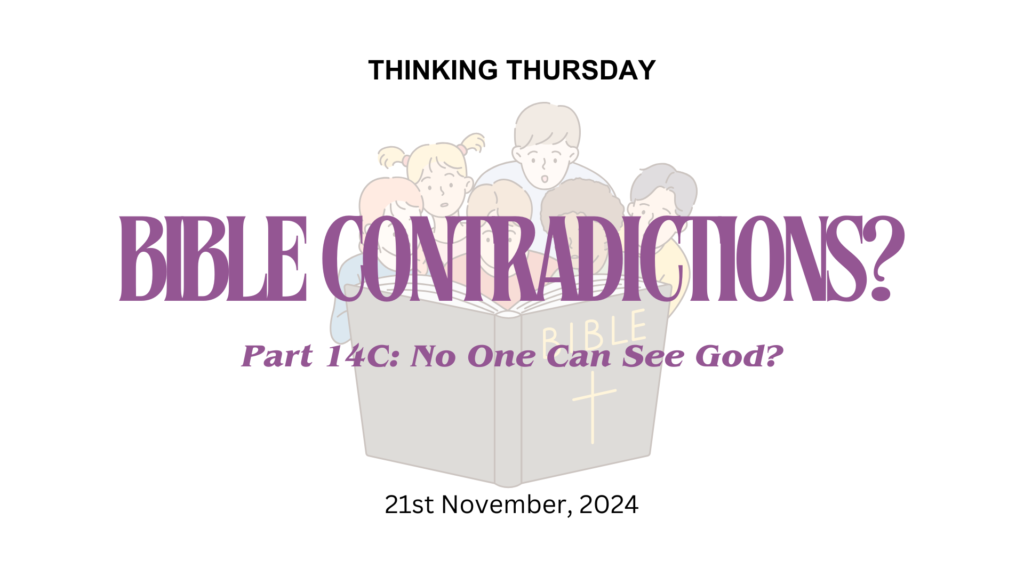Last time, we saw scriptures that tell us that some people, indeed, will see God sometime in the future. But we also saw that the Bible says we see Him but not “fully”?
John 1:18 – “No one has ever seen God, but the one and only Son, who is himself God and is in closest relationship with the Father, has made him known.”
John 14:9 – “Jesus answered: ‘Don’t you know me, Philip, even after I have been among you such a long time? Anyone who has seen me has seen the Father. How can you say, “Show us the Father”?'”
Eph 3:12 IN HIM and through faith in Him WE may ENTER GOD’S PRESENCE with boldness and confidence.
How has the Lord Jesus made the Father God known?
There is a distinction between seeing God’s face in the form in which it is impossible (as he told Moses), and the form in which Moses actually saw Him, as provided in the Scriptures. To understand this, we will have to examine the ways that people saw (or wanted to see) God in Scriptures.
READ BEFORE: BIBLE CONTRADICTIONS (PART 14B)
SEEING HIS GLORY
God told Moses that he couldn’t see His glory in Exodus 33:11, when Moses said, “I want to see your glory”.
The Hebrew word for ‘glory’ is ‘Kabod’ which refers to splendour, honour, His majesty, weightiness. And it occurs a lot of times in the Bible (no less than 200 times). It refers to an abundance, reputation, reverence, dignity, etc. Kabod, translated in the King James Version to mean ‘glory’, is used in different ways, mostly to refer to God, but it is also used to refer to human beings.
When the scriptures say, “Jacob got all his glory from Laban”, it’s the word Kabod (Genesis 31:1). Same with Joseph when in Genesis 45:13 Joseph said, “Tell my father of all my glory in Egypt”… It’s the word, Kabod.
Kabod is also translated as ‘abundance’. It covers everything, including physical wealth. It was used about Balaam when he refused to curse Israelites and he was offered riches, gold and silver and honour (kabod) – Numbers 22:17.
READ NEXT: BIBLE CONTRADICTIONS (PART 14D)
Moses and the Kabod of God
Now in Exodus 33:19-20, God responds to Moses, whom He obviously used to reveal Himself to in the tent:
He said, “I’ll cause all my goodness to pass before you, and I’ll proclaim the name ‘the LORD’ before you. I’ll be gracious to whom I’ll be gracious, and I’ll show compassion on whom I’ll show compassion. But,” He said, “You cannot see my face, because a man cannot see me and live.”
This ‘kabod’ is what God said that Moses could not see — His fullness, His abundance, His weightiness. It wasn’t possible, in the sense that man cannot handle the weight of His presence.
In 2 Chronicles 7:2, the priest couldn’t enter the house of the Lord because the ‘kabod’ of the Lord had filled the Lord’s house.
Now, the Hebrew word for face is ‘paniym’. Moses had said, “I want to see your glory”. (‘kabod’ – fullness, gloriousness, honour, etc.)
God answers, “You cannot see My face”. He did not say, “You can’t see My glory,” but He said, “You can’t see My glory fully, face to face, facing forward… You can’t see it unobstructed, without shielding. If you want to see Me in front of me (frontally), you will not live. You will die.” Next, we shall look closely at the ‘shielding’ medium through which we may see God and stay alive.
Watch the entire Q&A session of “What Does the Bible Say About Divorce?”
